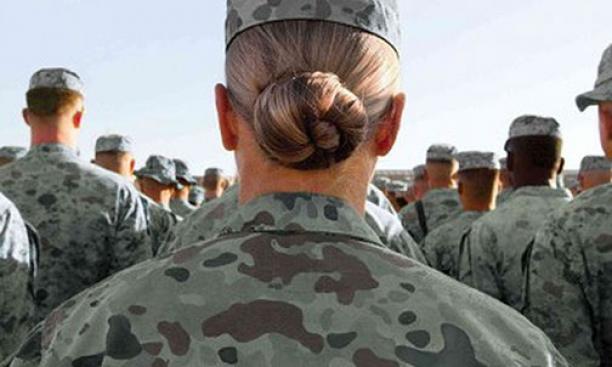

The three women at the center of Helen Thorpe ’87’s new book had various reasons for enlisting in the Indiana National Guard — from needing the money to seeking adventure — but none anticipated that she would be sent overseas to a war zone. All three served in Afghanistan, two in Iraq. One of the women, who starts out as a supply clerk, ends up driving a truck protecting a supply convoy and runs over an explosive device, leaving her with a serious head injury.
Soldier Girls: The Battles of Three Women at Home and at War meticulously captures the tedium, fear, and loneliness of war — and the consequences for the women’s personal lives. Thorpe, a journalist who has written for The New Yorker and Slate, pored through thousands of emails, Facebook posts, letters, and psychological evaluations, and spent years interviewing the women and their families to portray what happened to them when they became full-time soldiers.
Michelle, who describes herself as a “music-loving, pot-smoking, left-leaning hippie,” was 18 when she enlisted, hoping to make money for the college education she thinks will help her escape a drab life in southern Indiana. Desma, a single mother with three children who signs up for vague reasons, has just three days to find someone to care for her children when she is sent overseas. At 51, Debbie joins to follow in the footsteps of her father, who was a drill sergeant in the U.S. Army. She becomes a grandmother while on her first deployment, to Afghanistan. Thorpe spoke with PAW about how the women fared in a war zone and what happened when they came home.
How did the 30-year age difference between Michelle and Debbie affect their experiences in Afghanistan?
Michelle was 21, and had all these infantry soldiers hounding her everywhere she went. They would read her last name on her uniform and call out to her as if they knew her, even if they did not. She was propositioned from dawn to dusk, and she found the degree and intensity of attention from male soldiers to be overwhelming. And her good friend Debbie was 52 and looking on, thinking, “Wow, it’s been a long time since somebody paid that much attention to me.” Those are both really legitimate female perspectives.
Michelle gets her toenails painted every time she goes to Bagram, Afghanistan’s largest military base, because, you write, she “wanted to hang on to the sense of being a woman, and that was hard to do as a soldier.”
The military they were serving in was used to soldiers being men. Michelle was struck by the fact that her dog tags kept getting snarled up in her bra and were turning her breasts green. Dog tags were definitely designed with men in mind.

Before going to Iraq, Desma trains with an infantry regiment, which has about 100 men and only a couple of women. How was she treated?
Most of those men had never served alongside women, and they made it abundantly clear that they would have preferred to keep it that way. When Desma goes for a weapons qualification test, she is told all four times she takes the test that she has failed. Only later, when she gets her hands on the test results, does she learn that she had actually passed all four times.
Anytime these women were in an environment where the gender ratio was really skewed, they struggled more. The closer the ratio was to 50/50, the better their experience. In the second previously all-male unit Desma served with, she says she formed lifelong bonds. It had to do with the unit leadership setting a tone that these women belonged there and were to be treated with dignity and respect.
Back home, Desma has three children. Her son is left in the care of her former boyfriend, and her two daughters live with Desma’s cousin. How does she stay in her children’s lives while she is deployed?
Desma called her children as often as possible, but made certain never to call on the same day of the week, never at the same time of day. It was easier on the family that way — they would not worry if they did not hear from her at the appointed hour. After her return, she worries that the two years she spent away have hurt her children. One of her daughters falls two grades behind at school. Her son gets caught robbing a home and beating up the old man who lives there, and is sentenced to 20 years in prison. Desma can’t help but wonder, “Would he have turned to crime if I’d stayed home?”
Desma is driving a truck in a supply convoy to Tikrit when an IED explodes, leaving her with a concussion and headaches that wouldn’t go away. She develops post-traumatic stress disorder and insomnia.
Technically, I don’t think the military would have said she was in a combat role, but a bomb going off? Yeah, I’d call that combat violence.
At the end of the book, Debbie, the grandmother, feels that she, Michelle, and Desma “had become so interlaced that they are even more like a family than their ‘real’ families.” How does war form that bond?
It’s the experience of not wanting to put yourself at risk, yet feeling more alive maybe due to the danger. You come back home and everybody else that you know and love, they weren’t there with you, and you find that you can’t explain yourself to anyone.
After their deployments, how did the three women feel about women serving?
The most liberal of them, Michelle, concluded women did not belong in a war zone. That’s the conclusion she drew after watching Desma struggle to be a single mom and a soldier. Desma didn’t take that position at all. She felt it was great that she had the opportunities she’d had. She just wanted to get equal training. And then you had Debbie, who was like, “Darn! Too bad these changes didn’t come sooner. I could have been a sniper.”
Interview conducted and condensed by Merrell Noden ’78
